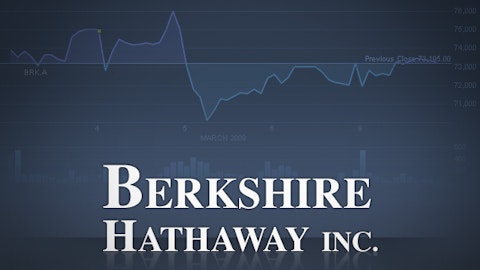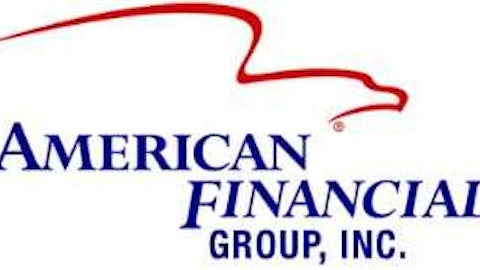
Source: 401(K) 2012.
I’ve seen it hundreds of times now.
When interest rates go up, bond values go down. That’s a lesson from Finance 101.
Many have taken this thought well past its logical conclusion, believing that if rates rise, major insurers that hold corporate and government bonds are set for serious book value erosion and investment losses.
Setting the record straight
The insurance industry is complex — it’s the most complicated, simple business on earth. Insurance companies receive premiums and invest them in anything from debt to equity. A typical property and casualty insurance company will hold a portfolio of roughly 95% bonds and 5% stock.
Seeing as your average insurer has 95% of its investment portfolio in debt, rising rates must be an ominous sign for insurance companies, right?
Not exactly.
When rates rise, the market value of a bond drops. A bond that sold for $1,000 might sell for $700 if rates rise 3%. But that doesn’t mean the insurer has to take the loss. Rather, an insurance company can hold the bond to maturity, at which point they would receive the $1,000 face value for the bond. (This assumes the issuer has the financial standing to make a payment, of course.)
Why rising rates might be good for insurers
If rates rise, insurance companies get the chance to invest premiums into higher-yielding securities. That could provide a boost to bottom-line profitability as their investment portfolios generate a higher return.
Once again, though, a seemingly logical thought is much too simple. Insurance is a highly competitive industry. Centuries of financial innovation and the emergence of statistics make it easier to price risk with each passing year.
For the most part, an insurance company knows exactly what it’s buying when it issues a new policy. It knows the expected value of a policy — premiums received minus claims and overhead costs.

American International Group Inc (NYSE:AIG)’s combined ratio wavers around 100%, meaning it breaks even on the contract, and makes a profit from investments.
When one company in a competitive industry like insurance is willing to live on razor thin margins — or even negative margins — it’s hard for the rest of the industry to compete. If rates rise substantially to the point where a 10-year US Treasury note pays 5% per year, we might see some insurers writing policies at break-even to expand their float and make a profit on investments.
So, even if rates rise, it’s not a guarantee that insurance companies will be better off; competitors may cut policy prices to adjust for higher rates.
Management is everything
Warren Buffett once said, “I try to buy stock in businesses that are so wonderful that an idiot can run them. Because sooner or later, one will.”
The insurance business is not so wonderful that an idiot can run and insurance company with guaranteed success.
Berkshire Hathaway Inc. (NYSE:BRK.A) (NYSE:BRK.B) writes policies through its insurance subsidiaries — GEICO, General Re, and Berkshire Reinsurance — with a focus on underwriting profits. Sure, the world’s greatest investor could rely on his stock-picking skills to turn insurance into a compounding machine, but why not make money when it writes a policy, too?
In every year in the last 10 years, Berkshire Hathaway Inc. (NYSE:BRK.A) (NYSE:BRK.B) generated an underwriting profit on insurance operations.
Likewise, The Chubb Corporation (NYSE:CB) and Markel Corporation (NYSE:MKL) have impressive investment performances, but they also have above-average underwriting standards.
In the second quarter, The Chubb Corporation (NYSE:CB) posted a combined ratio of 89%, meaning for every $1 it received in premiums, it incurred claims and costs of $0.89, so $0.11 went to gross profits. Markel Corporation (NYSE:MKL), a specialty insurer, posted a combined ratio of 92% in the second quarter and the first half of 2013, so $0.08 of every dollar in premiums was shareholders’.
For shareholders of these top insurance companies, investment profits are merely icing on the cake. The above insurance companies could simply stuff premiums under a mattress and still make a profit.
Insurers for all cycles
A good insurance company is an insurance company that understands capital allocation. The Chubb Corporation (NYSE:CB), Markel Corporation (NYSE:MKL), and Berkshire Hathaway Inc. (NYSE:BRK.A) (NYSE:BRK.B) understand that it is better to sacrifice growth than to write policies at a loss.
Rather than invest in new marketing or new underwriting efforts, these three companies back off when the economics no longer make sense. They’d prefer not to grow premiums than to issue unprofitable policies just to claim a new customer.
That’s what makes them great for investors — they think like investors. When rates rise, they won’t sit idle. Instead, they adjust, find risks that are overpriced, and write insurance to grow their underwriting and investment profits.
Rates won’t go up forever — they can fall, too — which is why it’s so important to invest in companies that don’t shift their goal with each minute uptick in interest rates. Rising rates are great for well-run insurance companies.
Berkshire Hathaway Inc. (NYSE:BRK.A) (NYSE:BRK.B), The Chubb Corporation (NYSE:CB), and Markel Corporation (NYSE:MKL) certainly fit in the “well-run” category — they’re insurance companies you should feel comfortable holding regardless of where the 10-year Treasury yield is today, tomorrow, or 20 years from now.
The article No, Rising Rates Won’t Crush These Stocks originally appeared on Fool.com.
Fool contributor Jordan Wathen has no position in any stocks mentioned. The Motley Fool recommends American International Group (NYSE:AIG), Berkshire Hathaway, and Markel. The Motley Fool owns shares of American International Group, Berkshire Hathaway, and Markel and has the following options: long January 2014 $25 calls on American International Group.
Copyright © 1995 – 2013 The Motley Fool, LLC. All rights reserved. The Motley Fool has a disclosure policy.




